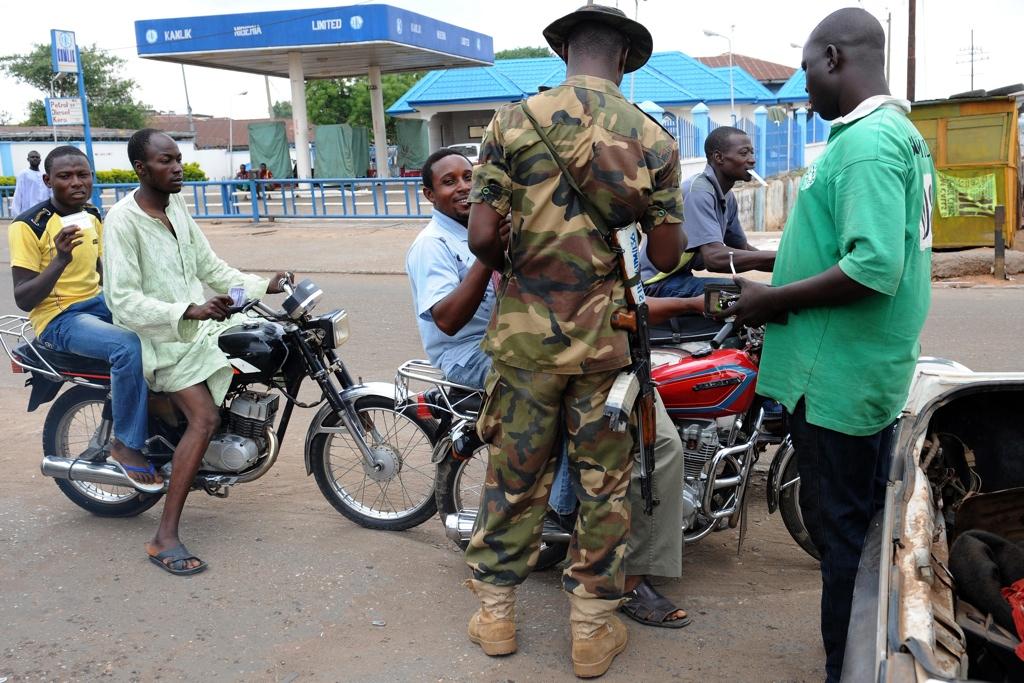Nigeria: Boko Haram violence has many causes
Nigeria has increased its security following a number of deadly attacks by Boko Haram, a group of Islamic extremists. Here a Nigerian soldier interrogates motorcyclists at a checkpoint in Kaduna State.
WASHINGTON — The recent spate of brutal attacks in Nigeria by Boko Haram, the local terrorist group professing allegiance to Al Qaeda, has drawn attention to West Africa as the next battleground against violent global jihad.
Senior US officials have expressed concern over connections between Boko Haram and Al Qaeda in the Islamic Maghreb (AQIM) and Al Shabaab in Somalia.
But in Nigeria, no less than in Pakistan, a fanatical ideology often cloaks far more local economic and tribal rivalries. This deep rooting in very local political contexts and economic ambitions also hampers the terrorists’ efforts at forging pan-African jihad.
Although most visible and vicious, Boko Haram is not the only militant group in Nigeria. In the oil-rich south, the Movement for the Emancipation of the Niger Delta (MEND) roams the swamps and links up with politicians in the crumbling cities.
Nor is Boko Haram Nigeria's only jihadi group. Hisba, a collection of Islamist vigilante gangs, also operates in the north. Both tap into decades of tribal violence among Nigeria’s communities, often manipulated by politicians for political gain and profit. The local adoption of Shariah law in 1999 has neither quelled Islamist mobilization in Nigeria’s north nor redressed the deep dissatisfaction with socioeconomic conditions and poor governance.
Instead, vociferous religious ideology periodically obscures violence driven more by economic factors.
For example, migration by the ethnic Hausa Fulani into Yoruba lands has produced conflict. The fact that the Yoruba are predominantly Christians and the Hausa Fulani Muslims matters only secondarily. Rather, the Hausa-Fulani Boko Haram is infusing religion into a long-churning brew of grievances about wealth and power distribution, corruption, and injustice.
The Nigerian government has responded poorly not only to the long-standing communal tensions, but also to the specific case of Boko Haram, often ignoring or instigating the former while brutally and indiscriminately overreacting toward the latter. Although Nigeria’s police are more capacious than most in West Africa, they overwhelmingly lack intelligence capacity and the ability to either disrupt attacks before they happen or track down real culprits who are at times connected to key local politicians.
As in much of West Africa, governance in Nigeria was for decades characterized by predatory rapaciousness of governing elites and incomplete institutional development plaguing everything from rule of law to social services. Political contestation often centered on getting access to the state to control commodity rents, including oil.
Governance has been based around tribal, clan, or family loyalties. More than 10 years after the end of the Sani Abacha dictatorship, the attitude that government positions are means to the enrichment of oneself and one’s patronage network rather than a service to the overall Nigerian polity has been only slowly changing in Abuja and Nigeria’s state capitals.
But such parochial interests and loyalties also dominate pan-jihadi cooperation in the region. Although AQIM, Al Shabaab and Boko Haram may communicate over the same jihadi webpages and copy each others’ tactics, their global proclamations often clash with their very local interests and necessities.
How successfully outside terrorist groups navigate new territories depends on their understanding of local culture and the complex relationships between politicians, unofficial powerbrokers, and (il)legal economic networks. Crucially, it also depends on their sensitivities to the social constraints and entanglements of their local affiliates. For example, until the emergence of Al Shabaab in Somalia, Al Qaeda struggled to establish a base there and found the Somali clan rivalries to be maddeningly confounding and not conducive to global jihad. Al Shabaab’s recent troubles have come precisely from its military and social overreach.
Instead of reflexively portraying Boko Haram as a new Al Qaeda affiliate of a monolithic global jihad, US counterterrorism policy needs a more nuanced approach. It should exploit the natural rivalries and misunderstandings among the various terrorist groups and avoid inadvertently driving the often competing and fractious actors together.
The United States must be cautious when considering training security forces in West Africa. Some governments there can view counterterrorism and counternarcotics aid as yet another form of rent to be exploited for power and profit maximization, just like they had often seen anti-Communism aid. At worst, such funds can be used for repression of domestic political opposition. Instead of effectively countering terrorism, they may undermine institutional development and accountable governance.
Nigeria must move beyond the blunt use of lethal force by improving intelligence-gathering and building healthier civil-military relations. Sending tanks to the streets and declaring a state of emergency, as President Jonathan Goodluck did a few days ago, may appease the angry public, but it is not an effective counterterrorism policy.
The United States must encourage the Nigerian government to address the political, economic, and religious insecurities that give resonance to Boko Haram’s ideology. Finally, the Nigerian government must also empower and protect the many moderate Islamic leaders in the north that have stood up against Boko Haram even while facing assassinations. Ultimately, the real solutions to the Boko Haram menace are local.
Vanda Felbab-Brown is a fellow at the Brookings Institution in Washington, DC and James J.F. Forest is Associate Professor at the University of Massachusetts Lowell.
